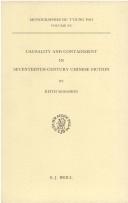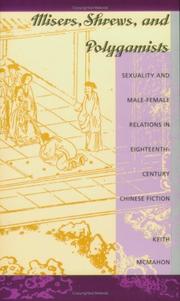| Listing 1 - 10 of 14 | << page >> |
Sort by
|

ISBN: 9004085459 Year: 1988 Volume: vol 15 Publisher: Leiden New York K!obenhavn Brill
Abstract | Keywords | Export | Availability | Bookmark
 Loading...
Loading...Choose an application
- Reference Manager
- EndNote
- RefWorks (Direct export to RefWorks)
Seksualiteit in de literatuur --- Sex in literature --- Sexe dans la littérature --- S16/0418 --- S16/0419 --- S16/0160 --- S16/0195 --- China: Literature and theatrical art--Traditional novels: Ming: studies, texts and translations --- China: Literature and theatrical art--Traditional novels: Qing: studies, texts and translations --- China: Literature and theatrical art--General works on traditional literature --- China: Literature and theatrical art--Thematic studies --- Chinese fiction --- Civilization, Modern --- Seventeenth century --- History and criticism --- Ming dynasty, 1368-1644 --- Qing dynasty, 1644-1912

ISBN: 0742518035 0742518027 Year: 2002 Publisher: Totowa Rowman & Littlefield
Abstract | Keywords | Export | Availability | Bookmark
 Loading...
Loading...Choose an application
- Reference Manager
- EndNote
- RefWorks (Direct export to RefWorks)
S11/0910 --- S02/0310 --- S04/0725 --- S04/0680 --- China: Social sciences--Opium and drugs --- China: General works--Intercultural dialogue --- China: History--Opium War and 1840 -1860 --- China: History--Qing: general: 1644 - 1912 --- Opium abuse --- China --- History --- Opium addiction --- Opium habit --- Drug abuse
Book
ISBN: 9781442255012 9781442255029 1442255013 1442255021 Year: 2016 Publisher: Lanham : Rowman & Littlefield,
Abstract | Keywords | Export | Availability | Bookmark
 Loading...
Loading...Choose an application
- Reference Manager
- EndNote
- RefWorks (Direct export to RefWorks)
"This volume completes Keith McMahon's acclaimed history of imperial wives and royal polygamy in China. Avoiding the stereotype of the emperor's plural wives as mere victims or playthings, the book considers empresses and concubines as full-fledged participants in palace life, whether as mothers, wives, or go-betweens in the emperor's relations with others in the palace. Although restrictions on women's participation in politics increased dramatically after Empress Wu in the Tang, the author follows the strong and active women, of both high and low rank, who continued to appear. They counseled emperors, ghostwrote for them, oversaw succession when they died, and dominated them when they were weak. They influenced the emperor's relationships with other women and enhanced their aura and that of the royal house with their acts of artistic and religious patronage. Dynastic history ended in China when the prohibition that women should not rule was defied for the final time by Dowager Cixi, the last great monarch before China's transformation into a republic"--Provided by publisher.
Emperors' spouses --- Mistresses --- Polygamy --- Concubinage --- Women --- Sex role --- S11/0710 --- S11/0740 --- Human females --- Wimmin --- Woman --- Womon --- Womyn --- Females --- Human beings --- Femininity --- Lovers (Mistresses) --- Paramours --- Spouses --- Common law marriage --- Free love --- Marriage --- Marriage law --- Multiple marriage --- Plural marriage --- Non-monogamous relationships --- History. --- Political aspects --- Political activity --- China: Social sciences--Women: general and before 1949 --- China: Social sciences--Sexual life: general and before 1949 --- Law and legislation --- China --- Politics and government --- Concubinage. --- Ehefrau. --- Emperors' spouses. --- Kaiser. --- Konkubine. --- Mistresses. --- Politics and government. --- Politisches Handeln. --- Sex role. --- History --- Political aspects. --- Political activity. --- 960-1912. --- China. --- Political aspects&delete& --- Political activity&delete&
Book
Year: 2013 Publisher: Lanham Rowman & Littlefield
Abstract | Keywords | Export | Availability | Bookmark
 Loading...
Loading...Choose an application
- Reference Manager
- EndNote
- RefWorks (Direct export to RefWorks)
Sociology of the family. Sociology of sexuality --- Politics --- History --- History --- Gender roles --- Power --- Adultery --- Politics --- Polygamy --- Monarchies --- Biographical details --- Book --- China
Book
ISBN: 1538141949 1442222905 9781442222908 9781442222908 1299713025 9781299713024 9781442222892 1442222891 9781538141946 Year: 2013 Publisher: Lanham, Md. : Rowman & Littlefield Pub.,
Abstract | Keywords | Export | Availability | Bookmark
 Loading...
Loading...Choose an application
- Reference Manager
- EndNote
- RefWorks (Direct export to RefWorks)
Chinese rulers guaranteed male successors by taking multiple wives, sometimes in the thousands. Women Shall Not Rule is a fascinating history of the imperial wives and concubines, especially in light of the greatest challenges to polygamous harmony-rivalry between women and their attempts to engage in politics. Keith McMahon, a leading expert on the history of gender in China, draws upon decades of research to describe polygamous emperors and women rulers throughout Chinese history. Displaying rare historical breadth, his
Emperors' spouses --- Mistresses --- Polygamy --- Concubinage --- Women --- Sex role --- History --- Political aspects --- Political activity --- China --- Politics and government

ISBN: 0822315661 0822397293 Year: 1995 Publisher: Durham : Duke University Press,
Abstract | Keywords | Export | Availability | Bookmark
 Loading...
Loading...Choose an application
- Reference Manager
- EndNote
- RefWorks (Direct export to RefWorks)
Having multiple wives was one of the mainstays of male privilege during the Ming and Qing dynasties of late imperial China. Based on a comprehensive reading of eighteenth-century Chinese novels and a theoretical approach grounded in poststructuralist, psychoanalytic, and feminist criticism, Misers, Shrews, and Polygamists examines how such privilege functions in these novels and provides the first full account of literary representations of sexuality and gender in pre-modern China.In many examples of rare erotic fiction, and in other works as well-known as Dream of the Red Chamber, Keith McMahon identifies a sexual economy defined by the figures of the "miser" and the "shrew"—caricatures of the retentive, self-containing man and the overflowing, male-enervating woman. Among these and other characters, the author explores the issues surrounding the practice of polygamy, the logic of its overvaluation of masculinity, and the nature of sexuality generally in Chinese society. How does the man with many wives manage and justify his sexual authority? Why and how might he escape or limit this presumed authority, sometimes to the point of portraying himself as abject before the shrewish woman? How do women accommodate or coddle the man, or else oppose, undermine, or remold him? And in what sense does the man place himself lower than the spiritually and morally superior woman?The most extensive English-language study of Chinese literature from the eighteenth century, this examination of polygamy will interest not only students of Chinese history, culture, and literature but also all those concerned with histories of gender and sexuality.
Man-woman relationships --- Sex customs --- Sex in literature --- Sex in literature.
Book
ISBN: 0824870808 0824837649 1441671447 Year: 2009 Publisher: Honolulu : University of Hawaii Press,
Abstract | Keywords | Export | Availability | Bookmark
 Loading...
Loading...Choose an application
- Reference Manager
- EndNote
- RefWorks (Direct export to RefWorks)
For centuries of Chinese history, polygamy and prostitution were closely linked practices that legitimized the "polygynous male," the man with multiple sexual partners. Despite their strict hierarchies, these practices also addressed fundamental antagonisms in sexual relations in serious and constructive ways. Qing fiction abounds in stories of female resistance and superiority. Women-main wives, concubines, and prostitutes-were adept at exerting control and gaining status for themselves, while men indulged in elaborate fantasies about female power. In Polygamy and Sublime Passion, Keith McMahon introduces a new concept, "passive polygamy," to explain the unusual number of Qing stories in which women take charge of a man's desires, turning him into an instrument of female will. To this he adds a story that haunted the institutions of polygamy and prostitution: the tale of "sublime passion," in which the main characters are a "remarkable" woman and her male lover.Throughout the book McMahon examines how polygamy, prostitution, and the story of sublime passion encountered the first stages of paradigmatic change in the nineteenth century, decades before the legal abolition of polygamy. By the end of the Qing dynasty in 1911, love stories were celebrating the exploits of street-smart prostitutes who fleeced gullible patrons in the bustling city of Shanghai. What do these characters have in common with their early counterparts as men and women became inhabitants of a new city in an era flooded with ideas from radically foreign sources-all of this taking place in a time of economic and cultural dislocation? McMahon reads late Qing love stories in a historically symbolic way, taking them as part of a larger fantasy of Chinese civilization undergoing a fundamental crisis. The polygamous marriage and the affairs of the brothel became metaphorical staging grounds for portraying the destiny of China on the verge of modernity. Finally, McMahon speculates on the changes polygamous sexuality underwent after the Qing dynasty ended and whether it exerted a residual influence in later times.Polygamy and Sublime Passion will undoubtedly engage those interested in Chinese society, culture, literature, and gender studies as well as comparativists seeking to understand the diverse responses to modernization around the world.
Marriage --- Concubinage --- Prostitution --- Polygamy --- Geschichte 1600-1912 --- China --- History
Book
ISBN: 9780824833763 Year: 2010 Publisher: Honolulu University of Hawaii press
Abstract | Keywords | Export | Availability | Bookmark
 Loading...
Loading...Choose an application
- Reference Manager
- EndNote
- RefWorks (Direct export to RefWorks)
Concubinage --- Marriage --- Polygamy --- Prostitution --- China --- History
Book
ISBN: 9004645349 Year: 1988 Publisher: Leiden : BRILL,
Abstract | Keywords | Export | Availability | Bookmark
 Loading...
Loading...Choose an application
- Reference Manager
- EndNote
- RefWorks (Direct export to RefWorks)
Chinese fiction --- Chinese fiction --- Civilization, Modern --- History and criticism. --- History and criticism.
Book
ISBN: 1442255021 Year: 2016 Publisher: Lanham : Rowman & Littlefield,
Abstract | Keywords | Export | Availability | Bookmark
 Loading...
Loading...Choose an application
- Reference Manager
- EndNote
- RefWorks (Direct export to RefWorks)
"This volume completes Keith McMahon's acclaimed history of imperial wives and royal polygamy in China. Avoiding the stereotype of the emperor's plural wives as mere victims or playthings, the book considers empresses and concubines as full-fledged participants in palace life, whether as mothers, wives, or go-betweens in the emperor's relations with others in the palace. Although restrictions on women's participation in politics increased dramatically after Empress Wu in the Tang, the author follows the strong and active women, of both high and low rank, who continued to appear. They counseled emperors, ghostwrote for them, oversaw succession when they died, and dominated them when they were weak. They influenced the emperor's relationships with other women and enhanced their aura and that of the royal house with their acts of artistic and religious patronage. Dynastic history ended in China when the prohibition that women should not rule was defied for the final time by Dowager Cixi, the last great monarch before China's transformation into a republic"--Provided by publisher.
Emperors' spouses --- Mistresses --- Polygamy --- Concubinage --- Emperors' spouses --- Mistresses --- Women --- Sex role --- History. --- History. --- Political aspects --- History. --- History. --- Political activity --- History. --- History. --- China --- China --- Politics and government --- Politics and government
| Listing 1 - 10 of 14 | << page >> |
Sort by
|

 Search
Search Feedback
Feedback About
About Help
Help News
News